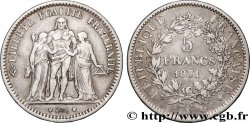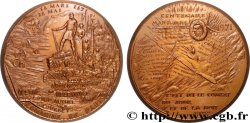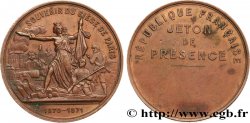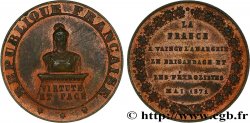E-auction 644-652953 - THE COMMUNE Médaille, Hommage à la Commune de Paris
Чтобы принять участие в торгах, вы должны войти в систему и стать подтвержденным участником аукциона. Войдите, чтобы сделать ставку. Ваш аккаунт будет подтвержден в течение 48 часов. Не ждите до закрытия торгов, чтобы зарегистрироваться.Сделав ставку на данный товар, вы вступаете в юридическое соглашение на покупку выбранного товара и нажатием кнопки «Сделать ставку» подтверждаете принятие вами условий интернет-аукционов cgb.fr.
Ставка может бить сделана только в полном эквиваленте евро. Торги закроются согласно времени, указанному в описании товара, все ставки, сделанные после закрытия торгов, учитываться не будут. Не следует откладывать предложение вашей ставки до последнего момента, так как система может не успеть обработать вашу заявку, и ваша ставка не будет принята. Более детальную информацию вы найдёте здесь: FAQ по интернет-аукционам.
БЕСПЛАТНО.
БЕСПЛАТНО.
2025/08/18 20:38:40
fme_1051798
644
Вам необходимо авторизоваться, чтобы сделать ставку
Нажмите сюда, чтобы войти
Тип Médaille, Hommage à la Commune de Paris
Дата: (1871)
Металл: bronze
Диаметр: 67 mm
Ориентация осей монеты: 12 h.
Гравер GOSSELIN André
Вес: 164,17 g.
Век: lisse
Пуансон: sans poinçon
Комментарии о состоянии
Patine hétérogène avec la présence de marques d’oxydation, de rayures et de coups notamment sur le revers
Лицевая сторона
Аверс: легенда: LIBERTE.
Аверс: описание: Une figure centrale, le regard vers le haut, porte un bonnet phrygien représentant la Liberté et la République avec de part et d’autre des chaînes. En dessous, l’arrière-plan présente un mur criblé de balles, un homme titube tandis que d’autres sont au sol. Signé : ANDRÉ GOSSELIN.
Обратная сторона
Реверс: легенда: HOMMAGE A LA COMMUNE DE PARIS - 1871.
Реверс: Описание: Légende circulaire.
Комментарий
Le 2 septembre 1870, Napoléon III capitule à Sedan et les Prussiens envahissent la France. Pendant l’hiver, Paris, assiégé, connaît les bombardements et la famine mais refuse de s’avouer vaincu. Paris rejette également la nouvelle Assemblée nationale issue des élections du 8 février 1871, majoritairement composée de monarchistes et de hobereaux campagnards, favorables à la paix, tandis que les élus de Paris sont des républicains. Le Gouvernement de la République, dirigé par Thiers, se réunit d’abord à Bordeaux, puis à Versailles afin de ne pas prendre le risque d’être retenu en otage par les Parisiens. Thiers veut conclure un traité de paix alors que les élus parisiens refusent l’entrée des Prussiens dans Paris et de se laisser désarmer. Ils veulent également ouvrir une nouvelle ère politique et sociale.
Une guerre sans merci s'engage entre la Commune et le gouvernement de Thiers qui reçoit l'appui du chancelier Bismarck. La Commune de Paris dure un peu plus de deux mois, du 19 mars au 28 mai 1871. Elle est finalement vaincue durant la "semaine sanglante" qui débute avec l'entrée des troupes versaillaises dans Paris le 21 mai et s'achève par les derniers combats autour du cimetière du Père Lachaise le 28 mai.
La répression est impitoyable. Le nombre des fusillés sans procès varie entre 20 000 et 30 000 personnes. (cf.Sénat).
On September 2, 1870, Napoleon III capitulated at Sedan and the Prussians invaded France.. During the winter, Paris, under siege, experienced bombardments and famine but refused to admit defeat.. Paris also rejected the new National Assembly resulting from the elections of February 8, 1871, composed mainly of monarchists and country squires, in favor of peace, while the elected representatives of Paris were republicans.. The Government of the Republic, led by Thiers, met first in Bordeaux, then in Versailles so as not to risk being held hostage by the Parisians.. Thiers wants to conclude a peace treaty while the Parisian elected officials refuse the entry of the Prussians into Paris and to allow themselves to be disarmed.. They also want to open a new political and social era.
A merciless war began between the Commune and the Thiers government, which received the support of Chancellor Bismarck.. The Paris Commune lasted a little over two months, from March 19 to May 28, 1871. It was finally defeated during the \\\"bloody week\\\" which began with the entry of Versailles troops into Paris on May 21 and ended with the last battles around the Père Lachaise cemetery on May 28..
The repression is merciless. The number of those shot without trial varies between 20,000 and 30,000 people.. (cf. Senate)
Une guerre sans merci s'engage entre la Commune et le gouvernement de Thiers qui reçoit l'appui du chancelier Bismarck. La Commune de Paris dure un peu plus de deux mois, du 19 mars au 28 mai 1871. Elle est finalement vaincue durant la "semaine sanglante" qui débute avec l'entrée des troupes versaillaises dans Paris le 21 mai et s'achève par les derniers combats autour du cimetière du Père Lachaise le 28 mai.
La répression est impitoyable. Le nombre des fusillés sans procès varie entre 20 000 et 30 000 personnes. (cf.Sénat).
On September 2, 1870, Napoleon III capitulated at Sedan and the Prussians invaded France.. During the winter, Paris, under siege, experienced bombardments and famine but refused to admit defeat.. Paris also rejected the new National Assembly resulting from the elections of February 8, 1871, composed mainly of monarchists and country squires, in favor of peace, while the elected representatives of Paris were republicans.. The Government of the Republic, led by Thiers, met first in Bordeaux, then in Versailles so as not to risk being held hostage by the Parisians.. Thiers wants to conclude a peace treaty while the Parisian elected officials refuse the entry of the Prussians into Paris and to allow themselves to be disarmed.. They also want to open a new political and social era.
A merciless war began between the Commune and the Thiers government, which received the support of Chancellor Bismarck.. The Paris Commune lasted a little over two months, from March 19 to May 28, 1871. It was finally defeated during the \\\"bloody week\\\" which began with the entry of Versailles troops into Paris on May 21 and ended with the last battles around the Père Lachaise cemetery on May 28..
The repression is merciless. The number of those shot without trial varies between 20,000 and 30,000 people.. (cf. Senate)








 Cообщить об ошибке
Cообщить об ошибке Распечатать страницу
Распечатать страницу Отправить мой выбор
Отправить мой выбор Задать вопрос
Задать вопрос Consign / sell
Consign / sell
 Информация
Информация










